Railroads responded to structural challenges by slashing jobs. Did nothing for volume but did everything for their stocks.
By Wolf Richter for WOLF STREET.
The North American Class 1 freight railroads – BNSF, Union Pacific, Norfolk Southern, CSX, Canadian National, Kansas City Southern, and Canadian Pacific – have been shedding employees since 2015, and in November they shed another 1.6% of their employees, from October, bringing the total down to 114,960 employees, according to data released by the Surface Transportation Board (STB), an independent federal agency. It was the lowest headcount in many, many decades.
November headcount was down by 13.7% from a year ago, down by 22% from the Great Recession low at the end of 2009 (147,000), and down by 33.5% from the recent high in April 2015 (174,000):
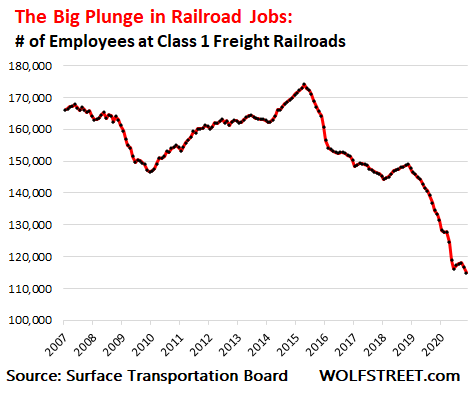
Railroads submit employment data – along with a slew of other operating data – to the STB on a monthly basis. I have excluded Amtrak (the National Railroad Passenger Corporation) because it is not a freight railroad (it too cut headcount).
Back in 1997, which is as far back as the publicly released data by the STB goes, railroads employed 178,000 people. In 1998, railroads employed 180,000. Employment in November was down by 36% from 1998. The chart below shows Class 1 railroad employment in each year in December, except for 2020, when I used November (in recent years, headcounts dropped further from November to December):
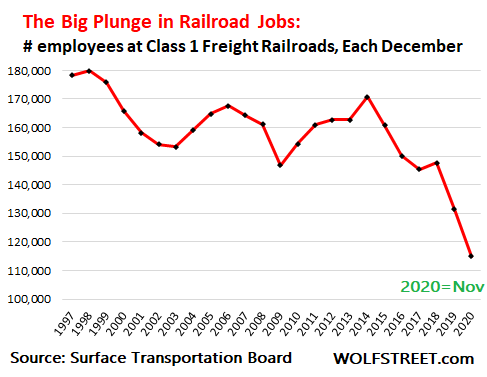
Compared to November last year, each of the Class 1 railroads shed employees, in order of the number of remaining employees:
- BNSF: -15.6% (35,081)
- Union Pacific: -13.4% (32,046)
- Norfolk Southern: -15.9% (19,199)
- CSX: -9.0% (17,093)
- Canadian National: -13.2% (6,183)
- Kansas City Southern: -10.1% (2,718)
- Canadian Pacific: -9.4% (2,640)
Since September 2016, which is as far as the STB’s monthly data by individual railroad goes back, some railroads have been busier than others shedding employees. All combined have shed 24.6% of their people. Each railroad, in order of the biggest shedders in percentage terms:
- CSX: -30.5%
- Norfolk Southern: -30.2%
- Union Pacific: -29.5%
- BNSF: -17.7%
- Kansas City Southern: -9.3%
- Canadian Pacific: -5.1%
- Canadian National: -4.8%
The chart below shows the relentless progress in shedding employees by each of the railroads over the past four years:
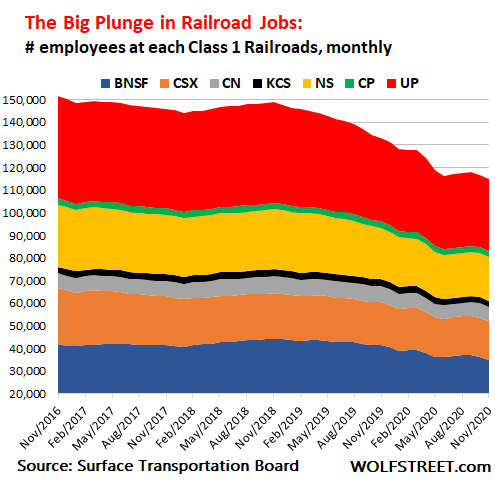
There are some structural challenges railroads have faced over the past two decades, including the decline of coal as the primary fuel for power generation (coal went from a share of 55% in the 1980s to a share of 23% these days). Coal – like other bulk commodities such as corn or petroleum products, and in addition to goods such as motor vehicles and industrial equipment – falls under the railroad metric of “carloads.” And the decline of coal is largely the cause of the long-term decline of carloads, from around 1.45 million car loads per month in 2005 and 2006, to just over 900,000 carloads currently.
The intermodal business (hauling containers and trailers) has been the growth sector for railroads. But this is precisely where competition from truckers has been ferocious, much of it based on service, such as speed, convenience, and reliability. And a deterioration in service sends container traffic to the highway.
The chart shows the originations of carloads (red) and intermodal (green) by all Class 1 railroads combined, monthly and their 6-month moving average:
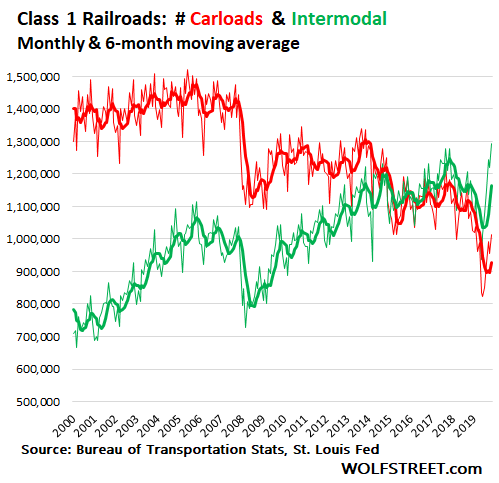
Total traffic volume over the long term, with all types of loads combined, puts the railroads in a highly volatile, cyclical, and horribly stagnant business. The good thing for railroads is that intermodal is a relatively high-margin business that brings in the dollars.
This chart of carloads and intermodal combined, as 6-month moving average, shows just how tough this business is, and rampant cost cutting, if it entails lowering service quality, will send more of the booming intermodal business to the highway. Total originations have dropped 16% since the peak in 2006:
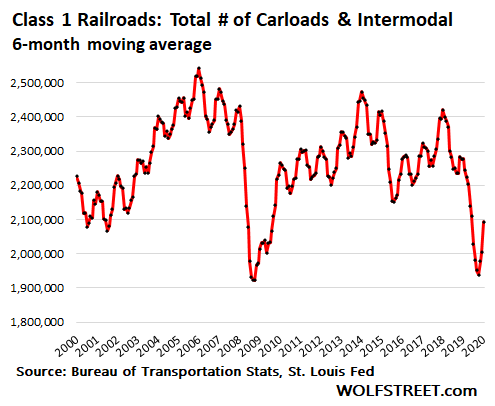
Railroads have responded to the long-term challenges by cutting costs. The hottest cost-cutting system is Precision Scheduled Railroading (PSR), under which railroads attempt to operate their carload and intermodal business more efficiently, such as more point-to-point routing. Other folks have called it slash-and-burn because it ends up slashing headcount and capital expenses.
Some folks have come to believe that PSR actually stands for Positive Shareholder Reaction, because it has done precisely that; these days, everything boils down to pumping up share prices no matter what, even if it sends business to the highway.
So this is the WOLF STREET Railroad Index, based on market cap in billions of dollars of Union Pacific [UNP], Norfolk Southern [NSC], CSX [CSX], Canadian National [CNI], Kansas City Southern [KSU], and Canadian Pacific [CP]. Union Pacific, given its market cap of $137 billion, currently weighs 33.5% in the index. BNSF is owned by Berkshire Hathaway and is not included.
The index is up 18.3% year-to-date, despite the plunge in March. Since the bottom in March, it’s up 80%. It has nearly tripled from the high before the Great Recession in August 2008, even as total carload and intermodal originations have dropped 17% from the peak in 2006. Shedding massive numbers of employees has a marvelous effect on stock prices (market cap data via YCharts):
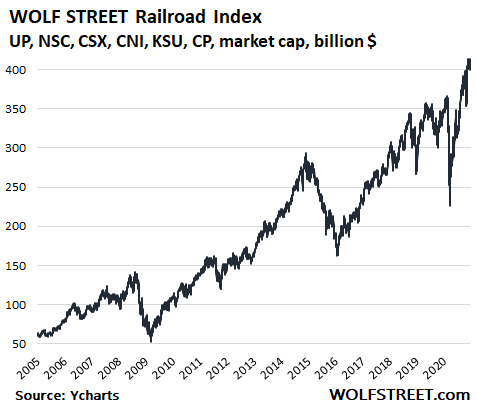
Enjoy reading WOLF STREET and want to support it? You can donate. I appreciate it immensely. Click on the mug to find out how:
![]()


If you look at that chart of total carloads and intermodal, you’d swear that we entered a recession in 2019.
How bad is PSR? In the 1930s, the railroads moved from sector based scheduling to end to end scheduling. Sector based scheduling was about getting trains in and out of one’s bailiwick as quickly as possible even if it meant inefficiencies in overall shipping. End to end based scheduling was about getting loads from point A to point B as efficiently as possible. Needless to say, end to end cost jobs, and the depression in the 1930s was no joke. Despite this, 1933 was a good year to buy railroad stock.
Interesting – This begs the Question.. If Intermodal Rail is Down.. and Trucking is up.. Obviously.. Rail Jobs are being reduced.. would not more Truckers be hired?
What would the Net Jobs picture look like – Less Rail workers. More Truckers?
What is the Net Jobs picture?
McMort,
Excellent question.
I think a fair argument can be made that the 21st century US employment crisis is less one of excess employee shedding (does anyone *really* want to fight long term increases in productivity?) and more one of failed uptake of employees in pathological industries (medicine, higher education, homebuilding, etc.)
Despite fairly wildfire inflation in those pathological industries, and some limited uptake of widely avl labor…the inflation in those pathological industries – despite increased labor supply – remains notably bad.
That’s what makes them pathological.
Why?
Government policy is part of it (failure rewarded with increased funding, ZIRP empowering pricing abuse, etc) but there is more to it than that.
Law might be one industry you might want to consider pathological. When combined with the regulatory network that goes with it this is a fairly large portion of the economy.
I like that notion of “pathological industries”…..it’s similar to “parasitic industries”, but kinda sounds better….both are the cause of many problems, but like everything else, it’s a matter of degree.
And the personal goals of the people in a position to run them.
Back from eating….only 3 of us, sister, brother, and me.
Just wanted to clarify that I didn’t necessarily agree with your comment, in fact in didn’t quit understand it, but I picked up a new term for use in my own business lexicon.
Happy winter Solstice to all.
More details are needed for railroad employment jobs lost.
Some 1980s railroads still had cabooses with two men inside. These were not needed since the 1960s.
All 1980s diesel electric locomotives used to have three men in them. One was a “fireman” for shoveling coal.
The railroad unions are some of most powerful unions in America. They protect their railroad jobs no matter if technology has made them completely obsolete. It took 40 years of negotiations to remove the fireman in diesel electric locomotives.
I could give a dozen other crazy union contract clauses that kept crazy work rules and the jobs that went them through the entire industry.
An now some talk about autonomous freight trains powered by
artificial intelligence.
I wonder how much of recent layoffs have been mostly about busting the unions. I suspect many union positions are being replaced by the same people working through temp agencies and various non-union subcontractors.
I had a short career in railroading 30 years ago, as a locomotive mechanic, and I was paid through a temp agency. That made things simpler for both me and the company. At that time I was able to live OK without overtime pay, holiday pay, vacation pay, health benefits, pension plan, etc.
Ultimately their “precision scheduling” will be a farce as cutbacks in track maintenance leads to more derailments. But that is the way US industry almost always operates: run the infrastructure into the ground, then abandon it for more profitable investments elsewhere. Even better when the government buys up the remnants, like Amtrak.
Who needs railroads when we can all eat Fed Reserve Notes instead?
When it comes to crazy work rules, one might keep in mind that railroading was extremely dangerous work for many decades. Killing off one’s employees kinda poisons the vaunted “employer-employee relationship”.
Very on-point.I was thinking same thing re. Unions.we need More unions who are reasonable,but just More unions.Alot of joblosses have been about union busting as the teachers,nurses,service industry can tell you.BNSF just derailed,leaked,exploded in WA two days ago.Here’s something to keep you up at night;E.P.A. and whatever else fed. Agency approved railtransport of oil and fracking liquids in railcars that are not necessarily up to recognized safety standards.I think this passed within the last two years.Unsafe cars,barebones safety crew,barebones rail maintenance,increased use of rails not maintained.Remember many stories re. This subject of barebones inspections,maintenance,safety protocols from the 1980s and 90’s.This way of doing biz is common in America because regulators are exindustry foxes guarding the henhouse,because elected officials get beucoup bucks from industry,and because it is cheaper to pay the miniscule safety fine/tortlawsuit$ than to pay union salary/bennies for a nationwide railway workforce.Even if lawsuit goes against whatever co.,the fines,penalties,legal costs are deductible and passed on to consumers!
2Banana:
“I could give a dozen other crazy union contract clauses that kept crazy work rules and the jobs….”
Remember, it takes at least two to agree to a contract. Where concessions are granted for one party the other may consider as advantages.
Totally off topics, Wolf, your WTF chart for Tesla made it onto Marketwatch. A picture is worth a thousand words there.
Remember us little people when you’re running Marketwatch from your headseat at the Wolfstreet media empire.
Wolfstreet media empire taking over! Wolfstreet will need its fact checkers soon to make sure the empires message gets heard properly :P
Wolf
Merry Xmas I must say reading your articles and all the comments from everyone else, helps my sanity in an insane world. A little peace to everyone. Thank You!
Amen to that! Probably the only place where the “comments” actually help to enlighten and clarify. The lack of acrimony and “I’m smart, you’re dumb” contention is a pleasure. Thanks Wolf and all the rest of ya! Happy Hollandaise!
2021 is shaping up to be a dire year for the employee. Feeling the pressure at my job where half my co-workers (and myself) fear and openly ask if they are going to be eliminated. RIF, COVID or other possibly performance but that is not the lead candidate. We might have to use the new term Positive Shareholder Reaction PSR
Well, at least you are ahead of the people for whom 2020 was already a dire year.
And, truth be told, every year since 2000 has not been particularly great shakes for the American labor market…so you have some people beat by two decades.
Those head count reductions are huge. The secondary impact will play out over years. Loss of institutional knowledge and lower morale will likely translate into poorer service outcomes for their customers. Perhaps driving them into the arms of competitors. Long haul trucking fleets maybe?
I have watched that play out over the last two decades with a lot of our technology clients. Not in a good way either.
Merry Christmas and Happy Holidays everyone. I’m going to check out for the next few hours. I’ll be hiding behind the couch to sneak up on Santa when he comes down the chimney.
Merry Christmas to you as well! Thank you for all of the hard work you do.
Merry Christmas to you and your family! Thanks for all the good work you do for us readers.
Wolf, Merry Christmas & Happy Holidays back at ya. You do a fine job on WolfStreet.com, and it is much appreciated. I just hope that PG&E doesn’t do the maintenance on your chimney brick, or Santa is in big trouble! He would bring you a bag of coal if they did, but it would have to come by Amazon.com since not available by rail to your locale. May 2021 be a kinder year to all!!
Merry Xmas Wolf , thank you for your superb reporting! And to Nick and his family in Barcelona.
Merry Christmas to you and your family. Thank you for some great reading material this past year :)
& tell Santa he might want to stick around and haunt TPTB this holiday season for us all. Maybe he can co-ordinate with the ghosts of Christmas past.
SNUSFU – Situation’s Nomal, US’s F’ked UP
According to my calculations, the 3 trillion the Fed gave to the Ultra Rich/Wall Street is equal to $10,000 per person in the US.
Anything less than a stimulus check of about $30,000 per person is basic common sense.
If you oppose it, you clearly are an advocate of Devine Royalty and despise working folk.
timbers
$600 buys you a Starbucks Coffee twice a week. Give me a break.
Let’s look at that $600 compensation on a daily and monthly basis since the covid crisis began (roughly 9 months). Larry Summers is already beating the media brush asserting that the economy may overheat from that $600 payment. He’s likely Biden’s mouthpiece, but other’s may disagree.
Daily basis compensation for 9 months covid terror is roughly 600/270 = $2.22 per day.
Monthly basis compensation for 9 months covid terror is roughly 600/9= $66.67 per month.
If you have an old car and no collision $600 might pay for your car insurance, but nothing else.
Note the only reason you might get $600 is because Bernie Sanders pushed for it, not Biden , Pelosi (the one with the $25000 ice cream refrigerator) or the Democrats in general.
So, are you saying the the payment should be more or less?
My question to this comment from Summers was, don’t we have data from other countries that did a version of UBI? Are there economies experiencing “overheating”? Wasn’t one of the accepted viewpoints after GFC that we didn’t throw *enough* money at the people via stimulus???
Most of the stimulus went to banks for car loans,mortgages,or creditcard payments or the $ went to China and Amazon/Walmart.
I usually keep my electric Teslionel railroad under the Christmas tree hauling loads of gold nuggets painted to simulate coal in worn out Lehigh Valley hoppers from 1948. Wait! Someone stole the tree and replaced it with a Festivus pole. Guess we can move on to the feats of strength part. I wonder if Uncle Charles Samuel Atlas can bear the full load of the soggy economy on his shoulders this year? Bet he pulls his groin again. Happy Ha Nuclear or whatever wholey day you celebrate now. Or is that celebriate? Gotta keep up with the style news, you know.
“Happy Holidaze.”
In the early morning of 6 July 2013, a runaway train hauling 72 tankers filled with crude oil derailed in the centre of the town of Lac-Mégantic, Quebec. The tanker cars exploded and the oil caught fire, killing 47 people and destroying many buildings and other infrastructure in the town center.
One man ran the whole train. Think of the savings, the efficiency! No caboose, no brakeman. He stepped out to get a bite, forgot to put on the brakes properly.
It’s even worse than that. The train was stopped for the night, on the main line, on a grade. One locomotive out of five was left running, to supply air for the locomotive brakes, and way-to-few handbrakes were set.
The train driver retired to motel for the night. Sounds insane, doesn’t it, to leave a train of dangerous cargo unattended, next to highway, with unlocked cab, spitting half-burnt oil out the exhaust?
But it gets much, much worse. During the night there was an engine fire in the turbocharger caused by poor maintenance. Minor fire was put out, engine shut down, no more hand brakes set, everyone went back to bed. But nobody bothered to tell the train driver about the fire. Doh!
As locomotive air leaked off, the brakes let go and the train started rolling. Completely on its own.
The whole sordid episode was an inexcusable, preventable criminal act, but hey! Greed is Good, right?
With modern technology no drivers are required, and certainly not on goods trains, we can execute people 5000 miles away by remote control drone, how much simpler is it to drive a train remotely on a track, same applies to container ships, add in we don’t need to move people as much, Zoom and similar, remote control surgery robots, etc etc, and transportation will relentlessly shed jobs down to a much lower level, principally consisting of maintenance staff of various types and rolls.
I wanna see that computer train change a broken coupler or brake hose by itself. Now that would be worth paying to see!
Container ships…..or even super tankers (like I have been part of the crew on at one time).
Try to bring one into a busy port (they are all busy) without a “Pilot” and commander tending the direction, speed, and controls using binoculars, two way radios and tug boats to make that happen. Good luck and sorry about what got demolished.
A.I.
I dont think the average person realizes the incredible amount of maintenance it takes to keep a container ship running; the best of ships are undermanned, and are operating with 85% of equipment operational on a good day. Not that many US flagged container ships remain.
Enjoyed my Christmas Eve by going out to my local Irish Pub in the pouring rain and flooded roads and ordered 2 take out Turkey dinners for us. Every resturant here is closed for indoor dining but you can sit outside in the cold and rain if you’d like. That is what our County Exec proposed. Wolf’s beer mug got a work out. Actually, for some reason, beer tastes much better in a thick bear mug than it does in those thin glasses they supply at the pub, and you don’t have to worry about it tipping over.
Merry Christmas & Happy Holidays
Looks like Warren Buffet has made out handsomely on his railroad investment.
The railroad employees, not so much.
If your view of large corporations is they are sources of lifetime employment, what you really want is a government job.
Some industries change faster/slower than others, but railroads have to adjust to social, regulatory and financial pressures to stay competitive. To the extent they fail in this basic responsibility (as GM did in 2009), they go bankrupt and all employees are at risk (1979 GM US employment: 618,000; 2019 GM US employment: 85,000).
Buffett (actually the Berkshire management team) keeps BNSF very healthy (including, as necessary, trimming excess employees), and customers, shareholders and remainning employees benefit.
We had lasagna and left a bunch with our elderly friend. The wine made it an early night for me :-) Today I will be cooking a turkey and try to make the day as fun with just two as with our close family. Extra turkey and trimmings for the neighbour!!
The bright side is Covid now down 30% in the Province and hovers around 5 new cases per one million population on Vancouver Island. That, and Moderna injections start on Monday in our more remote areas.
All the best to WS folks and good riddance to 2020.
The railroads like any business has the responsibility to earn a return on assets invested. This includes right sizing the business to the amount of revenue and attempting to become more efficient. It seems cruel, but the alternative is a depletion of productive investments and a lower standard of living for society.
For 1000 – 3000 mile trips there is no competitive alternative on price for most goods if you have time for it to go by rail. Barge traffic is cheapest way but very limited in areas served.
Not to say your statements are not correct but…, continuing unemployment of the people laid off results in a lower standard of living for society also.
I don’t disagree we need to have safety nets, but standard of living improvements come from generating a lot of revenue per employee. For automotive it’s like $700,000 revenue per employee to be able to deliver a $35,000 car to consumer and make a mid single digit profit. It’s usually a stressful existence for labor if you are working in a competitive industry.
Standards of living increases come from productivity improvements
So how do we clean up the environmental messes? If we do that, does that comply with the ‘standards of productivity?’ If it does not, then we really need to change the standards. A national job guarantee would produce full employment. Better than unemployment. Would that help the standards of productivity?
Chris
1) How clean up the mess”: Example: environmental health is what’s called a “common good” (in the benefit or interest of all, and appropriate for everybody to pay for); it’s entirely appropriate for regulation to require reasonable correction of the mess (example: car pollution). Productivity gets measured from a base that includes manufacturing cars that include care of the common good (no leaded gasoline, catalytic converters, et al).
2) Previous Federal “job training” programs have demonstrated that there are a few million people who don’t want a “guaranteed job” under essentially any circumstance. For example some (not all) would rather peddle drugs, or engage in other less than virtuous avocations. As you may (or may not) imagine, adding this cohort to the “employed” only drags down avg productivity.
Merry Christmas Wolf!
Could the internet be affecting this industry too? All trucking companies can know instantly where a load becomes available and can more easily grab it. Trucking companies have flexibility that rail can’t have. Look at all the trucking logistics companies that have popped up all over to manage this growth.
Merry Xmas Wolf!!
Ate & drank to much yesterday with my family.
Today we do it all over again with the in laws.
Metro railroad is no exception.Washington DC metro decided to close stations and stop weekend service (at the proposal level) and previously they increased fares. Closure of stations means lot of service workers could loose their jobs? They cited the lack of passengers due to COVID. Now the metro is in downward spiral and here we go again.
Merry Christmas (or happy holidays) to everyone. This year is a bumpy ride for everyone I suppose. Wolf, can you write a timeline for this year, like what are the most important events economically in 2020?
2021 is spelled as 2020 won!
Right now I would say the last minute Brexit deal. Th reflationary stock market and main street Fed bailout of course and the preservation of the corporate credit bubble. The Federal failure to control the second wave of the virus at Thanksgiving and now Christmas (air travel kaching). Why didn’t the government order the airlines to stand down? The economic blowback from opening too soon and failing to lock down may be THE event.
The railroad workforce was so bloated it made the postal union and UAW envious. Also affecting railroad freight levels are new petroleum pipelines. Always laughed at the enviro-wackos blocking pipeline construction while 2-mile-long trains hauled tank cars full of oil daily from N. Dakota.
Adding my thanks to Wolf and most of the WS commentariat for comfort and support during this very challenging year.
Very helpful to read many on here with experience and the common sense that derives from that, rather than the theoretical nonsense that has held me out of SM since mid 80s era, and now seems to be creeping into the RE mkt as well.
Howse about we have a motto of, ”Let’s get it done and have more fun in 21!”
Merry Christmas and or Happy Holy days of each and every kind to all y’all.
Thanks Wolf for all the hard work, letting the rest of us tag along.
I want to thank you for your occasional humorous ‘correction’ in a reply to a comment. Keeping the comments on track and useful has to be hard, and yet you pull it off, day in and day out.
A fine holiday to all.
Shippers who use the freight railroads said they were upset about being “captive” when they are served by one or a few rail carriers that charge them non-competitively high rates.
“Under the current test, railroads are able to unilaterally impose rate increases on customers without providing any justification for the new rates,” said Frank Chirumbole, a corporate executive who spoke for the American Chemistry Council.
In semi-related thoughts, the dynamics between rural and urban decay will be a key issue next year, as polarization adds to economic dysfunction. The pre-civil war-like mentality and pending government gridlock, with a lame duck president, inheriting a massive chaotic global challenge — will be taxing … Merry Christmas?
NOVEMBER 10, 2020
Trump touted the economy; the economy voted for Biden
The Republican Party “reflects an economic base situated in the nation’s struggling small towns and rural areas, remains frustrated, and sees no reason to consider the priorities and needs of the nation’s metropolitan centers,” Muro said. “That is not a scenario for economic consensus or achievement.”
NOV. 30, 2020,
What Makes A One-Term President?
We’ve become more polarized as a county, and as a result, the parties have become more ideologically uniform, making the factional politics that drive primary challengers less likely. Negative partisanship has also raised the stakes, crowding out the possibilities for a centrist independent candidacy to divide a party.
Not just jobs, but the good jobs are dying fast. Railroads are one of the few good paying employments in smaller towns and rural areas. Less healthcare and retirement benefits will just shift over to the government to do something with.
Hopefully, the highways and bridges will continue to hold up magically with ever increased volume and weight even though train tracks are cheaper to maintain for heavy transporting. One step forward, two steps back.
Interesting to know how many miles of rail line have been taken out of service. Railroads have been automating for years, are they automating faster than the trucking industry?
What happens to the RR right of way, after the tracks are pulled up for scrap?
The trucking industry can and will detour until the secondary roads are impassable. Then the public is asked to cough up for the vital infrastructure. After all, no trucks no deliveries to Walmart.
In my neighborhood the railroad right-of-way is now an ATV and snowmobile highway. Pedestrians are welcome too, if they dare…
Local potato shippers quit using the railroad many decades ago when the service became unreliable and potatoes arrived late and unsalable.
Absolutely true J.
When I was living off grid we had two miles of two lane paved road (with a big vineyard/winery at the end) as our main entrance from Hwy101. The whole valley it ran through was filled with vineyards. The rest was “all weather” shale, about 20 mi total, and we paid for maintenance on just the parts we used to get home.
Anyway we got in a court battle with the company (some back east outfit) over road fees we all paid as part of a chartered landowners association.
The expert testified that 1 loaded tractor trailer trip was equal to 1000 car trips…it may have been 5x that or more, wish I could remember.
Anyway, a few making the profits and the rest of us picking up the tab (on reduced wages and benefits, to boot) is just how the USA rolls now, right?
In addition to everything else, the railroads are under attack.
“On Saturday, the FBI’s Joint Terrorism Task Force arrested and charged two women in connection with a terrorist plot to sabotage railroad tracks in order to cause a train derailment. According to The New York Times, Ellen Brennan Reiche, 27, and Samantha Frances Brooks, 23, stand accused of placing a shunt on a railroad track in Bellingham, Washington.”
Like Lawyers, always have someone to blame, The Fed, or those evil Limited liability Co’s of whom detached from the lifelong indentured servitude of the the hallicon days of the Middle Ages.
Crypto disappears everytime another mile is reached in quantum computing. Vernor Vinge’s Masterpiece ‘Fire on the Deep’ is linear.
Sounds like a book that would go well with my cold (or hot) fusion power and dilithium crystal studies.
I know a guy that just started trucking a few months ago. Non stop work. He’s going to survive.
Paradox noted by multi generational family of truckers [not mine]: “You’ll spend all day in the cab, then all night underneath it (ref maintenance)”.
I’ve yet to met one trucker who did not perform [even minor] maintenance on their rig(s).
Thanks to Wolf and all commentators.
Stay safe
Merry XMas to Wolf and the commentators!!
They are making longer trains and trying to reduce terminal dwell. Loading cars is more sophisticated. They added track in places. One railroad hauls trona. That is a commodity few know about. You can not haul enough of it in a pickup truck.
Merry Christmas Wolf
You are serving prime here. Thank you
Here is to wishing all a better brighter new year.
1) US & EU export to China is down a lot. Goods shipped to China are falling, despite USD x9 months plunge.
2) You can’t get an empty container in China , because they are stuck in Europe and in US.
3) It’s a one way street.
4) In a normal year Cass R/R is peaking during mid year, decaying towards Dec.
5) This year is totally crazy. Long Beach is up 22% thx to Peleton yelling at u in your home.
6) The trade war with China isn’t failing. According to Cass 1R/R :
Total # of Carload & Inermodal.
7) The peak was in 2006. Cass 1 plunged from 2,550,00 in 2006 to 1,920,000 in 2008. Up to a lower high in 2014 and down to 1,940,000 in 2020.
8) A waterfall chart might happen in mid 2020’s.
9) R/R accumulated market cap reached $137B thx to the zero rate
Fed and Cass 1 2020 bear market bull run.
10) Don’t fight the Fed and the tape. The Fed ….